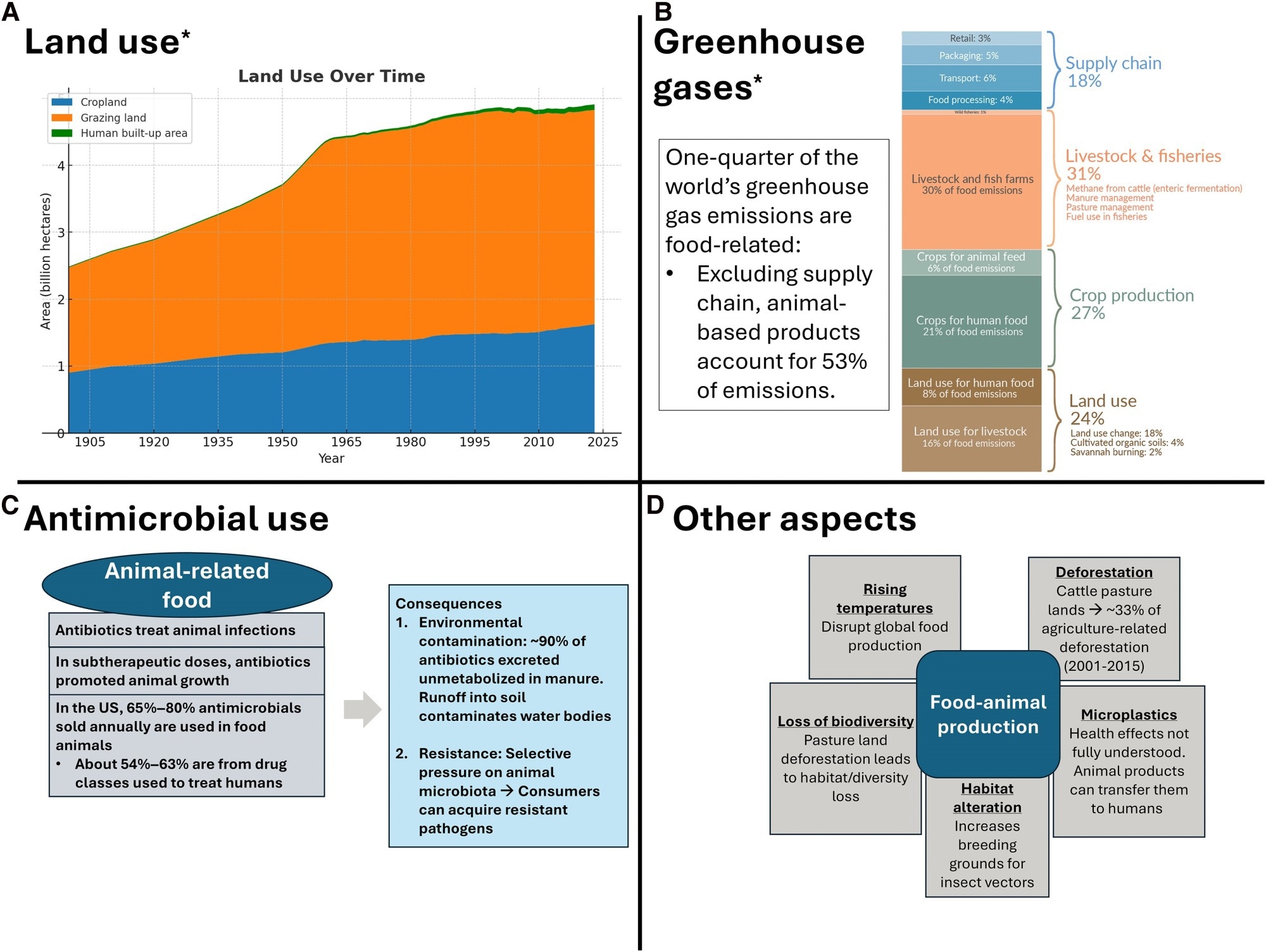A team of infectious disease specialists argues that shifting toward plant-based diets can simultaneously slow climate change, reduce antibiotic resistance, and lower disease risks - empowering clinicians to champion sustainable nutrition for a healthier planet.

Study: Plant-Based Diets and Climate Change, A Perspective for Infectious Disease Providers. Image Credit: Alkema Natalia / Shutterstock
In a recent review in the journal Open Forum Infectious Diseases, researchers discussed the contribution of animal agriculture to climate change and the spread of infectious diseases. They advocated adopting plant-based diets, which have the potential to mitigate climate change while improving public health.
Impacts of Animal Agriculture
Animal agriculture is a significant contributor to global greenhouse gas emissions and land degradation. Around half of the world’s habitable land is used for agriculture, with two-thirds of this allocated to livestock.
The meat industry alone accounts for nearly half of global methane emissions, mainly due to cattle farming. Additionally, deforestation driven by the expansion of grazing lands and feed crop production results in massive biodiversity loss.
Deforestation also creates ecological conditions that favor the transmission of diseases. For example, altered landscapes support more mosquito breeding sites, enhance vector survival, and increase human exposure to zoonotic pathogens. As a result, vector-borne diseases such as malaria and dengue are expected to rise significantly.
Between 2001 and 2015, cattle farming accounted for twice as much forest loss as all other agricultural activities combined. Despite these environmental costs, global meat consumption is projected to rise by 76% by 2050.
Rise in Antimicrobial Resistance
Antimicrobial resistance (AMR) is recognized by the World Health Organization (WHO) as a top global health threat, and its escalation is closely tied to antibiotic use in livestock.
Most antibiotics sold in the United States are used in agriculture to promote animal growth and prevent disease. When excreted in waste, they contaminate soil and water through runoff and manure used as fertilizer.
This widespread exposure to antibiotics promotes the emergence of resistant bacterial strains that can reach humans.
While some European countries have successfully restricted the use of antibiotics in livestock, progress in other regions remains slow. Reducing global demand for meat and dairy products could help curb antibiotic use in agriculture, thereby limiting the spread of AMR.
Plant-Based Diets Afford Numerous Benefits
Plant-based diets offer numerous health advantages compared with meat-heavy diets.
Evidence links them to lower risks of obesity, cardiovascular disease, type 2 diabetes, and overall mortality. Nutrients abundant in plant-based foods, such as fiber, vitamins C and E, beta-carotene, and polyphenols, strengthen immune function and reduce inflammation.
Types of Plant-Based Dietary Patterns
| Type of Plant-Based Dietary Pattern |
Red Meat |
Fish and Seafood |
Poultry |
Eggs |
Milk and Dairy Products |
Vegetables, Nuts, Legumes, Grains, and Fruits |
| Flexitariana |
X |
X |
X |
X |
X |
X |
| Pescatarian |
|
X |
|
X |
X |
X |
| Pollotarian/pollo-vegetarian |
|
|
X |
X |
X |
X |
| Lacto-ovo-vegetarian |
|
|
|
X |
X |
X |
| Ovo-vegetarian |
|
|
|
X |
|
X |
| Lacto-vegetarian |
|
|
|
|
X |
X |
| Vegan |
|
|
|
|
|
X |
Conversely, high intake of red and processed meats is associated with increased risks of cancer and heart disease. Medical organizations, including the WHO and American Heart Association (AHA), recommend limiting meat consumption and incorporating plant-based foods.
Emerging evidence suggests that plant-based diets may also reduce susceptibility to infectious diseases.
Studies have shown lower risks of respiratory infections, including coronavirus disease 2019 (COVID-19), among individuals following plant-based or pescatarian diets. For example, health care workers consuming such diets had up to 73% lower odds of developing severe COVID-19.
Higher intake of fruits and vegetables was also associated with milder symptoms and shorter hospital stays among hospitalized COVID-19 patients.
For people living with human immunodeficiency virus (HIV), who have a higher cardiovascular disease risk, plant-based diets may offer anti-inflammatory benefits and align with current AHA recommendations.
Similar protective effects have been observed for other chronic viral infections, including hepatitis C and human papillomavirus, though data remain limited.

Environmental consequences of dietary animal products. A, Graphical reflection of global land use over the past 120 years. B, Breakdown of greenhouse gas emissions related to food production. C, Consequences of antibiotic use in animal agriculture. D, Other negative consequences of animal-based food production. By authors Hannah Richie and Max Roser licensed under Creative Commons License CC-BY.
Challenges for Adoption
Despite its proven benefits, plant-based eating remains uncommon. Barriers include limited physician training in nutrition, socioeconomic inequalities, cultural preferences, and limited access to affordable plant-based foods.
Many low-income communities have access to limited healthy options, leading to increased rates of obesity and infection severity, as seen during the COVID-19 pandemic.
Health care providers can play a crucial role in counseling patients on gradual dietary changes. Hospitals can also lead by example: New York City’s largest health system recently shifted to plant-based meals as the default, cutting food-related carbon emissions by 36% and achieving cost savings.
Although cost is often cited as a barrier, data show that plant-based diets can be more affordable in high-income countries. From 2017 to 2023, American sales of plant-based foods doubled from $4 billion to $8 billion, and modeling studies have found that in high-income countries, healthy and sustainable dietary patterns can already be 22% to 34% less expensive than current average diets.
Expanding access to affordable alternatives through urban farming, subsidies, and public policy reforms could further support this transition.
Conclusions
To address these issues, the review recommends transitioning to plant-based diets as a practical, evidence-based step. This dietary shift is proposed to reduce environmental degradation and improve population health.
Even small reductions in meat consumption can produce measurable environmental benefits. For example, a 25% reduction in American meat intake could cut national greenhouse gas emissions by 1% annually.
Healthcare providers, particularly infectious disease specialists, are encouraged to offer dietary counseling as part of routine care and to support systemic changes that expand access to plant-based diets. These actions are key recommendations for advancing public health and sustainability.
A widespread move toward plant-based diets is a practical strategy to protect public health and the environment, benefiting both current and future generations.